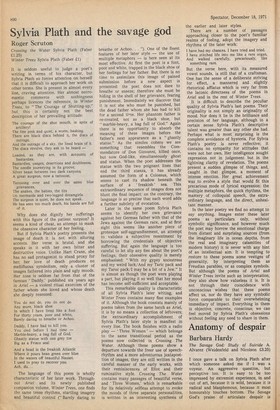Sylvia Plath and
Roger Scru ton
Crossing the Water Sylvia Plath (Faber £1.25) Winter Trees Sylvia Plath (Faber El)
It is seldom useful to judge a poet's writing in terms of his character, but Sylvia Plath so forces attention on herself that it is difficult to approach her work on other terms. She is present in almost every line, craving attention. Her almost necromantic commerce with nothingness perhaps licences the reference, in Winter Trees, to "The Courage of Shutting-up," but this is certainly not the best description of her prevailing attitude:
The courage of the shut mouth, in spite of artillery!
The line pink and quiet, a worm, basking. There are black discs behind it, the discs of outrage, And the outrage of a sky, the lined brain of it. The discs revolve, they ask to be heard — Loaded, as they are, with accounts of bastardies.
Bastardies, usages, desertions and doubleness. The needle journeying in its groove, Silver beast between two dark canyons, A great surgeon, now a tattooist, Tattooing over and over the same blue grievances, The snakes, the babies, the tits On mermaids and two-legged dreamgirls.
The surgeon is quiet, he does not speak.
He has seen too much death, his hands are full of it.
Why does she dignify her sufferings with this figure of the patient surgeon? It seems a kind of cheat, an attempt to mask the obsessive character of her feeling.
But if Sylvia Plath's poetry presents the image of death it is not with alluring accents. Her verse is brutal, and she speaks in it with her own bitter and destructive voice. Unlike Hart Crane, she has no sad protagonist to stand proxy for her; her love of death produces no mellifluous symbolism, only a cluster of images fathered into plain and ugly moods. Her tone is seldom far from that of the famous 'Daddy,' published six years ago in Ariel — a violent ritual exorcism of the father whom she loved and whose death she deeply resented:
You do not do, you do not do Any more, black shoe In which I have lived like a foot For thirty years, poor and white, Barely daring to breathe or Achoo.
Daddy, I have had to kill you. You died before I had time — Marble-heavy, a bag full of God, Ghastly statue with one grey toe Big as a Frisco seal And a head in the freakish Atlantic Where it pours bean green over blue In the waters off beautiful Nauset. I used to pray to recover you. Ach, du...
The language of this poem is wholly characteristic of her later work. Throughout Ariel and its newly published companion volume, Winter Trees, one finds the same tense rhythms, startling imagery and beautiful control (" Barely daring to










































 Previous page
Previous page